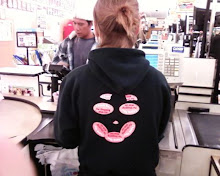The premise of Showtime's television show, "The United States of Tara," is that a mom of two is living with Multiple Personality Disorder, or Dissociative Identity Disorder. Is the previous season of the show, Tara had three other personalities that would emerge:
"Alice"-a Martha Stewart-type, fifties, baking, mom figure.
"Buck"-a male Vietnam War veteran.
and "T"-a fifteen-year-old, who is loud and promiscuous.
In the present season another personality arises after Tara "gets new meds" is a psychiatrist figure named "Shoshana."
The show goes on as Tara's husband Max and her two teenage children also try to cope with Tara's constant changing personalities.
The Psychoanalysis Theory would say that this disorder stemmed from something in Tara's past. It could have been childhood abuse and Tara's coping mechanism was to create personalities that could stand in for her as she goes inside herself to hide. She would create a personality that would be better suited to deal with the trauma.
This clip showed the different personalities at their finest.
"Alice" takes the role of the housewife, bakes and talks to teachers and tries to connect with Tara's husband, Max. This could stem with an estrangement that Tara feels with her husband or being the wife. This might be how Tara controls a feeling of being out of control with her role as a wife and mother. "Alice" is the perfect 50's housewife, so she is best suited for this role.
"T" has fun and has the ability to connect with Tara's teenage daughter, Kate. This might be because Tara might feel that she can not connect with her punk rock teenage daughter. "T" has a better understanding of Kate because she is a rebellious teenager, herself. Tara uses "T" because she feels that she is best suited for this role.
"Buck" likes to have a beer, go bowling, and tries to connect with Tara's teenage son, Marshall. This could be because Tara is aware of Marshall's homosexuality. Tara uses "Buck" to try to be a masculine role model for Marshall. Maybe Tara feels that her husband, Max, is not capable of fulfilling this role.
Tara could also be using this "alters" to get out of doing certain tasks. Tara's sister wants to go to a "Pampered Chef" party, so "T" arises, therefore Tara does not have to attend the party with her sister. Also, when Marshall is having problems at school, Tara uses "Alice" to stand in and have a conference withe the teacher, therefore Tara does not have to take part in conflict.
It also makes the audience wonder how much of the personalities are actually Tara and if she is just using them for her benefit. Have her conflicts of the past subsided or is she still using the "alters" for a way out?
This is a clip of the new season, still more crazy alters because Tara decides to go off of her "meds." We see in this season that "Buck" finds a love interest at the bar. Maybe this means that Tara has some homosexual fantasies herself. This could be because she wonders about why her son is homosexual, but Marshall finds a girlfriend. "Buck's" love interest could be reflection of Marshall's homosexuality.
Also, because Tara is trying to integrate her "alters" Tara is beginning to know what happens when she is "not there" because she has conversations with them. This is also the beginning of the therapy sessions with "Shoshana."
http://www.youtube.com/watch?v=2TBE7f5MQHo (The embed was disabled, but here's the link for that one.)
Tara is trying to "get better" so "Shoshana" becomes a confidant figure. Tara becomes aware of her alters and has conversations with them.
Even though Tara creates "Alice" to be the wife and "Buck" to be the male role model, Max has to be strong and be Tara's husband in spite of her illness. Tara is still is wife and he has to be the husband to all of Tara not just "Tara."
Ultimately, Tara's family has to remain solid even if Tara isn't. As Marshall said in this last clip, "Because of you, we get to be interesting." That sums up this show and the Psychoanalytical approach shows the complexities of all that is "Tara."
Wednesday, May 12, 2010
Subscribe to:
Post Comments (Atom)

No comments:
Post a Comment